Abstract
OBJECTIVE: This study determined whether renal allograft recipients with antibodies to hepatitis C virus (HCV) at the time of transplantation experienced increased morbidity or mortality from hepatitis, liver disease, or hepatocellular carcinoma compared with patients without anti-HCV. SUMMARY BACKGROUND DATA: Chronic liver disease is a cause of significant morbidity and mortality after kidney transplantation and the contribution of HCV to this problem has not been determined. The recent characterization of the HCV genome has resulted in the development of screening tests for antibody to HCV, allowing the identification of end-stage renal disease patients with anti-HCV who are candidates for transplantation. The risk to these patients for the development of hepatic complications after subsequent transplantation is unknown. METHODS: Archived sera obtained from 163 kidney transplant recipients at the time of transplantation were tested for anti-HCV using the Abbott HCV 2.0 second-generation test system. Sera containing anti-HCV were further analyzed for reactivity against specific HCV recombinant proteins, including core, NS3 (c33c), and NS4 (c100-3), to determine whether a pattern could be identified in patients with hepatic complications. The follow-up of all patients was current (mean length of follow-up was 33 months) to identify patients with hepatic complications. All patients had previously been tested for HBSAg. RESULTS: Twenty-nine patients (18%) had anti-HCV and three (1.8%) had HBSAg. Forty-five patients (28% of total) had transient elevations of AST or ALT without subsequent evidence of liver disease. Three patients had a syndrome of acute hepatitis. Chronic liver disease developed in only six patients (3.6%) after transplantation. Four had anti-HCV only, one had HBSAg only, and one was positive for both. However, of the 29 patients with anti-HCV, chronic liver disease developed in 5 (17%), including 1 patient who was positive for HBSAg. No patient had hepatocellular carcinoma. CONCLUSIONS: Perturbations of liver function were common in the kidney transplant recipients studied, most were self-limited, and few were associated with evidence of viral hepatitis. The risk of developing
Full text
PDF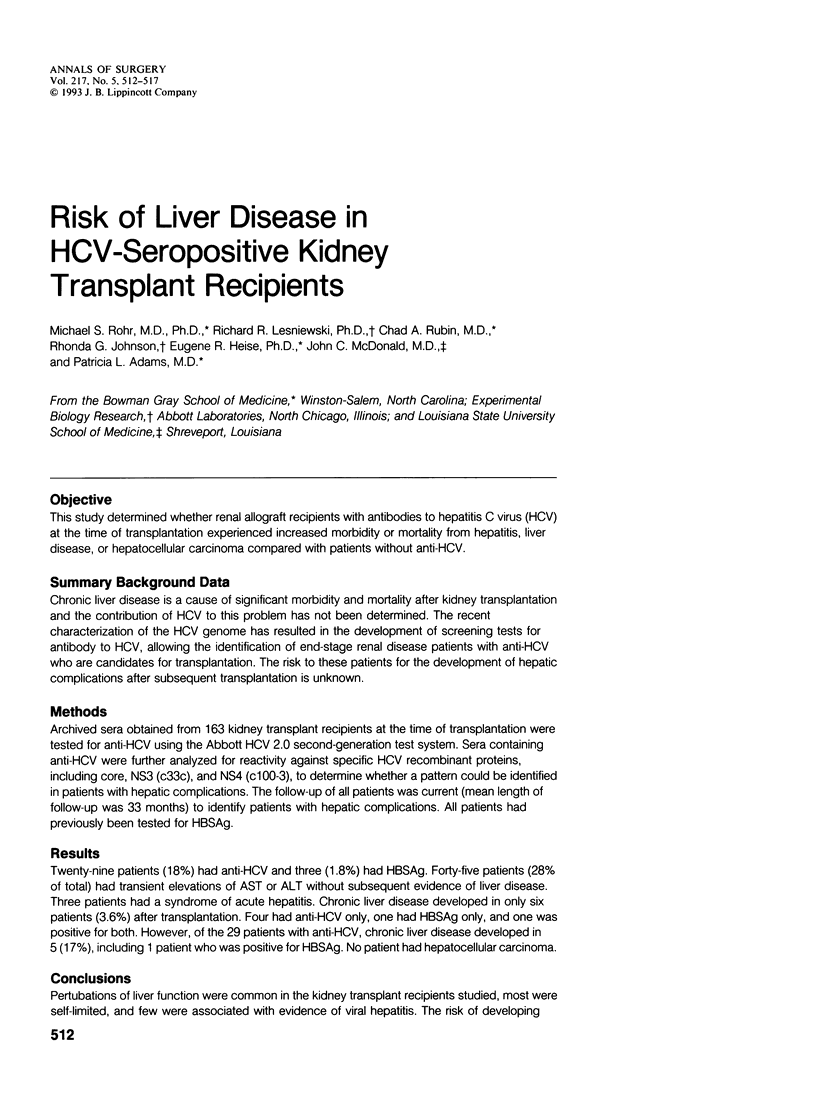
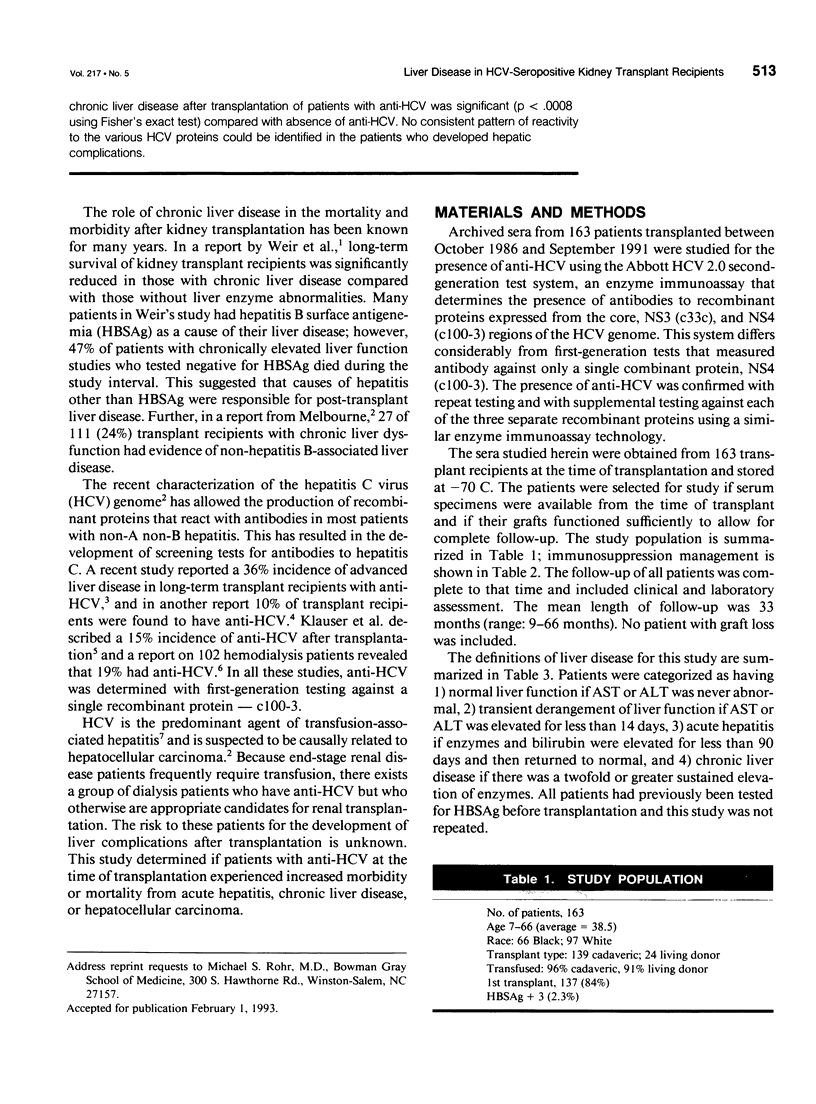
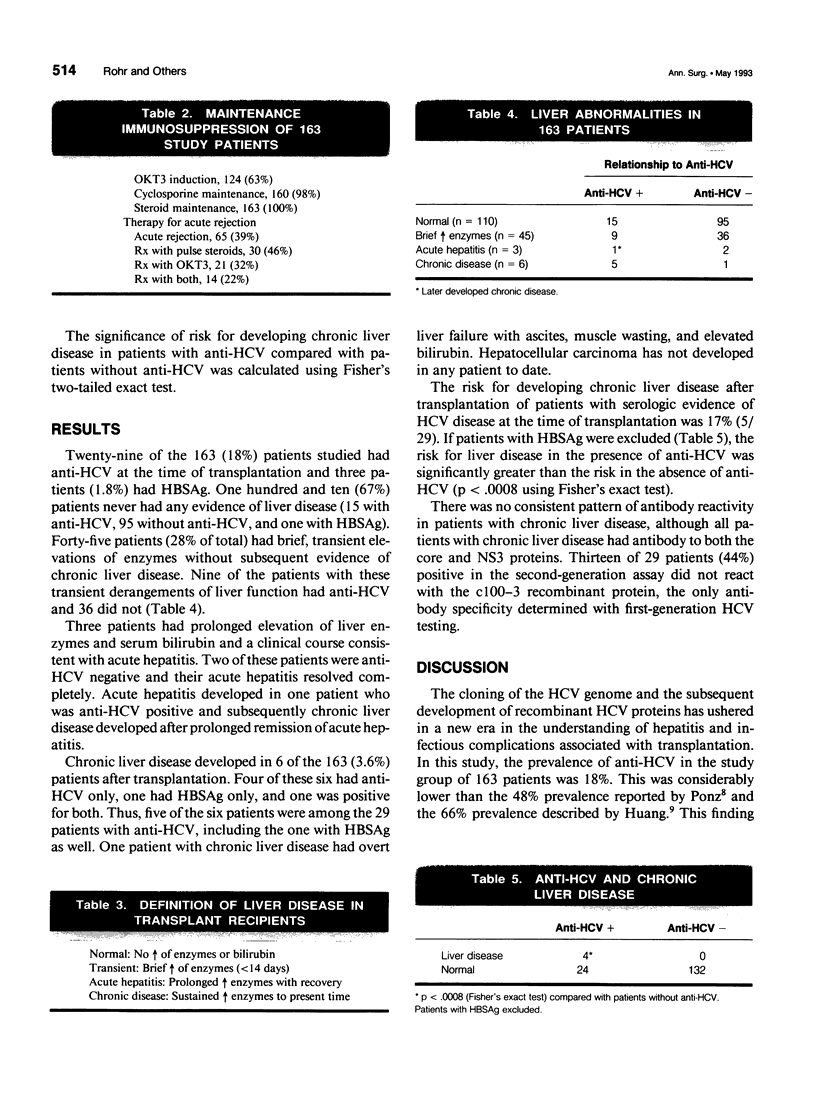
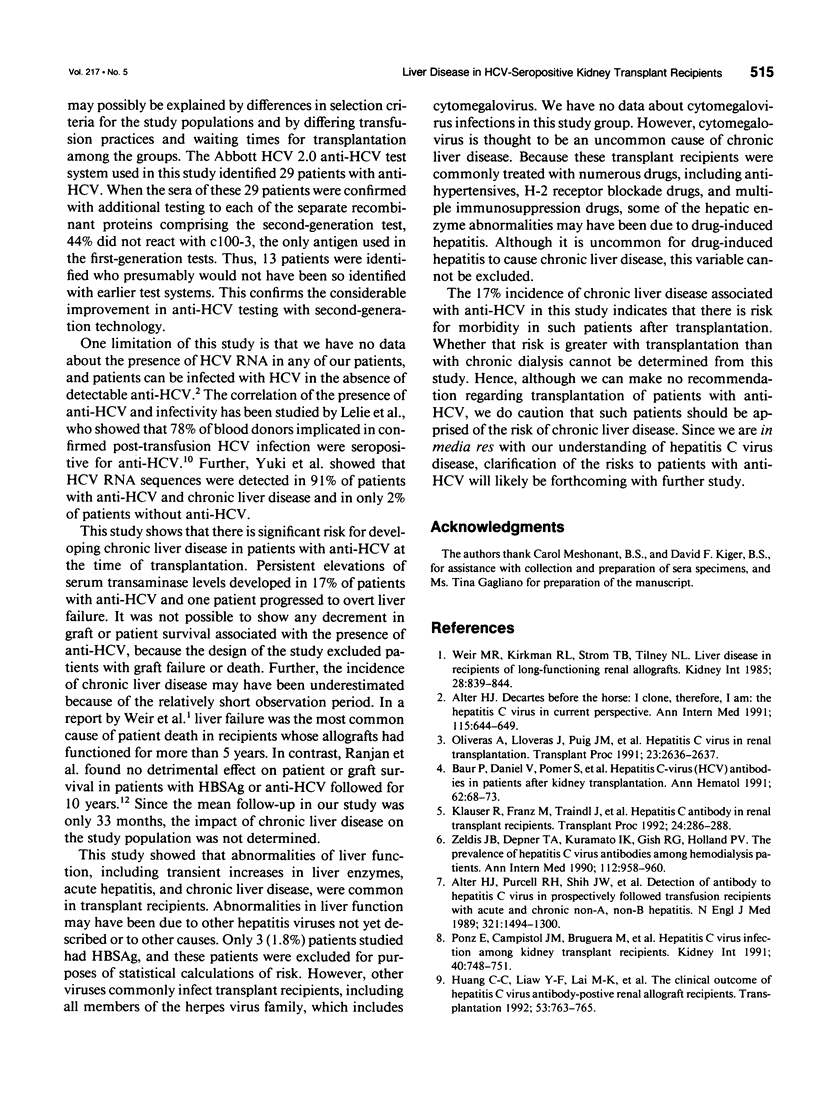
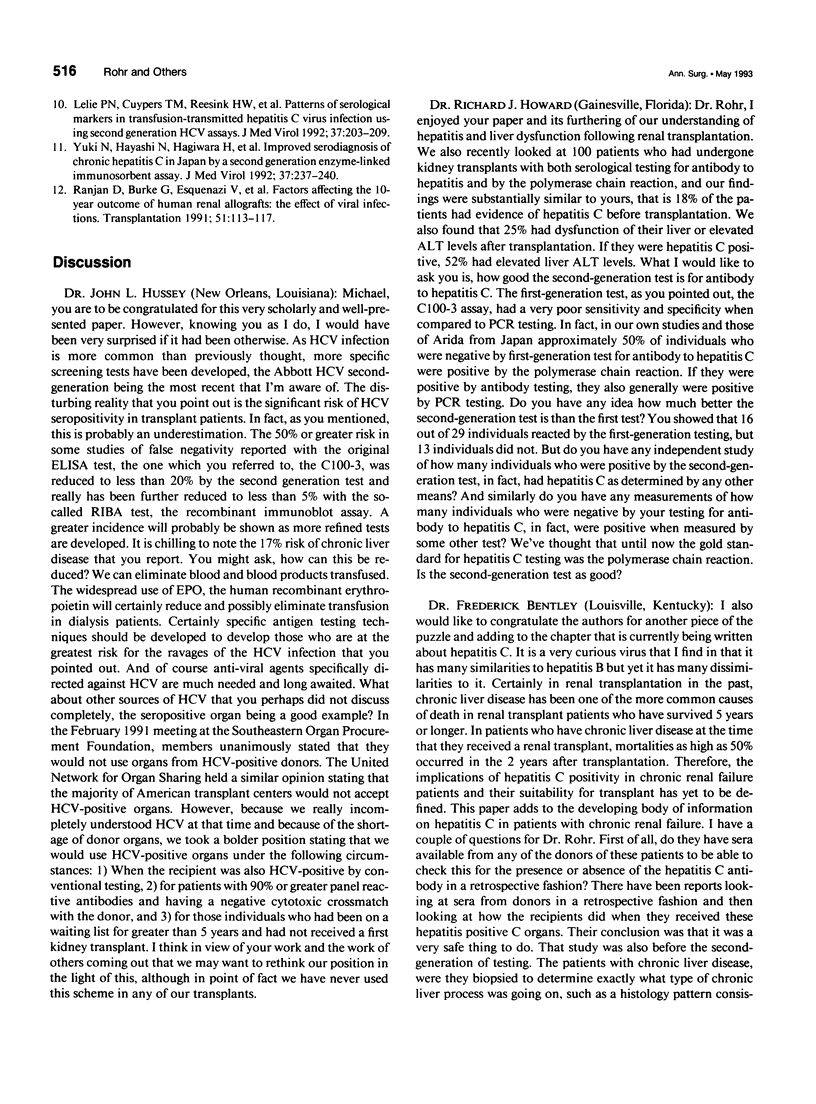
Selected References
These references are in PubMed. This may not be the complete list of references from this article.
- Alter H. J. Descartes before the horse: I clone, therefore I am: the hepatitis C virus in current perspective. Ann Intern Med. 1991 Oct 15;115(8):644–649. doi: 10.7326/0003-4819-115-8-644. [DOI] [PubMed] [Google Scholar]
- Alter H. J., Purcell R. H., Shih J. W., Melpolder J. C., Houghton M., Choo Q. L., Kuo G. Detection of antibody to hepatitis C virus in prospectively followed transfusion recipients with acute and chronic non-A, non-B hepatitis. N Engl J Med. 1989 Nov 30;321(22):1494–1500. doi: 10.1056/NEJM198911303212202. [DOI] [PubMed] [Google Scholar]
- Baur P., Daniel V., Pomer S., Scheurlen H., Opelz G., Roelcke D. Hepatitis C-virus (HCV) antibodies in patients after kidney transplantation. Ann Hematol. 1991 Feb-Mar;62(2-3):68–73. doi: 10.1007/BF01714903. [DOI] [PubMed] [Google Scholar]
- Huang C. C., Liaw Y. F., Lai M. K., Chu S. H., Chuang C. K., Huang J. Y. The clinical outcome of hepatitis C virus antibody-positive renal allograft recipients. Transplantation. 1992 Apr;53(4):763–765. doi: 10.1097/00007890-199204000-00011. [DOI] [PubMed] [Google Scholar]
- Klauser R., Franz M., Traindl O., Pidlich J., Hay U., Watschinger B., Pohanka E., Kovarik J. Hepatitis C antibody in renal transplant patients. Transplant Proc. 1992 Feb;24(1):286–288. [PubMed] [Google Scholar]
- Lelie P. N., Cuypers H. T., Reesink H. W., van der Poel C. L., Winkel I., Bakker E., van Exel-Oehlers P. J., Vallari D., Allain J. P., Mimms L. Patterns of serological markers in transfusion-transmitted hepatitis C virus infection using second-generation HCV assays. J Med Virol. 1992 Jul;37(3):203–209. doi: 10.1002/jmv.1890370310. [DOI] [PubMed] [Google Scholar]
- Oliveras A., Lloveras J., Puig J. M., Comerma I., Bruguera M., Barrera J., Mir M., Aubia J., Masramon J. Hepatitis C virus in renal transplantation. Transplant Proc. 1991 Oct;23(5):2636–2637. [PubMed] [Google Scholar]
- Ponz E., Campistol J. M., Bruguera M., Barrera J. M., Gil C., Pinto J. B., Andreu J. Hepatitis C virus infection among kidney transplant recipients. Kidney Int. 1991 Oct;40(4):748–751. doi: 10.1038/ki.1991.270. [DOI] [PubMed] [Google Scholar]
- Ranjan D., Burke G., Esquenazi V., Milgrom M., Koleilat N., Roth D., Gomez C., Olson L., Babischkin S., Gharagozloo H. Factors affecting the ten-year outcome of human renal allografts. The effect of viral infections. Transplantation. 1991 Jan;51(1):113–117. doi: 10.1097/00007890-199101000-00017. [DOI] [PubMed] [Google Scholar]
- Weir M. R., Kirkman R. L., Strom T. B., Tilney N. L. Liver disease in recipients of long-functioning renal allografts. Kidney Int. 1985 Nov;28(5):839–844. doi: 10.1038/ki.1985.206. [DOI] [PubMed] [Google Scholar]
- Yuki N., Hayashi N., Hagiwara H., Takehara T., Oshita M., Kasahara A., Fusamoto H., Kamada T. Improved serodiagnosis of chronic hepatitis C in Japan by a second-generation enzyme-linked immunosorbent assay. J Med Virol. 1992 Jul;37(3):237–240. doi: 10.1002/jmv.1890370316. [DOI] [PubMed] [Google Scholar]
- Zeldis J. B., Depner T. A., Kuramoto I. K., Gish R. G., Holland P. V. The prevalence of hepatitis C virus antibodies among hemodialysis patients. Ann Intern Med. 1990 Jun 15;112(12):958–960. doi: 10.7326/0003-4819-112-12-958. [DOI] [PubMed] [Google Scholar]


